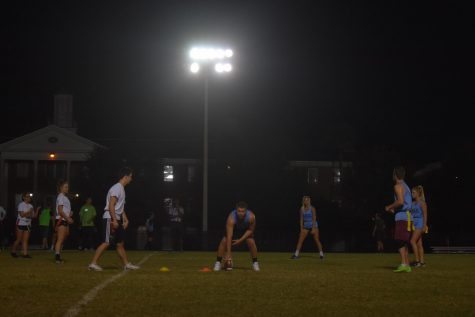New Hazing Law Changes Stetson Policy
Florida is passing a new state bill about hazing. What does that mean for Stetson?
A Florida bill has passed that will directly impact Stetson Greek life. Some changes included a redefinition of hazing, an expansion of the crime to include those involved in the planning of hazing, and introduces Andrew’s Law, named for Andrew Coffey (the FSU student who died from hazing), which states that those who meet certain standards may be immune from prosecution. More importantly, the liability will no longer be placed in the hands of Greek organizations, and will now be under the jurisdiction of Stetson starting Oct. 1.
A new definition of hazing states, “[…]Pressuring or coercing the student into violating state or federal law.” If a student undergoing rush or the recruitment process is pressured to drink underage, Stetson would be responsible for the enforcement of the law’s violation. Actions like this as well as drug use, and using terms of endearment that denote power differentials are considered hazing. A member of a sorority is not allowed to call a sorority sister “mom,” “child,” “baby,” or “daughter,” because it is considered a form of hazing by labeling them as “superior” or “under you.”
The CS/CS/CS for SB 1080, the state bill in question, states: “Public and nonpublic postsecondary educational institutions must provide a program for the enforcement of such rules and must adopt appropriate penalties for violations of such rules, to be administered by the person at the institution responsible for the sanctioning of such organizations.”
Starting on Oct. 1, Stetson must have a program that enforces these rules and penalizes those in Greek organizations who do not adhere to them. This new law complicates Stetson’s involvement in Greek life. Hazing appears to be heavily avoided on campus, but Stetson students that get involved in hazing, according to a Stetson sophomore involved in Greek life, would likely be prosecuted by both the university and their fraternity or sorority.
In general at Stetson, Greek life appears to not have hazing in recent history, aside from refutable claims. The death caused by hazing at Florida State University feeds into the negative stigma of Greek life that does not accurately portray Greek life at Stetson.
An anonymous fraternity member commented on the Greek life on campus, saying, “I cannot speak for other organizations, but I have never witnessed hazing or have been hazed.” To his understanding, Stetson would step in if there are reports of hazing. In regards to investigating hazing, “If it’s not provable then it’s a waste of time.” “Greek life gets a bad rep,” he continues by saying, “Greek life is very about.” Greek life has been beneficial to his experience as a student on campus, because his fraternity and others “focuses on the individual,” and “focus on the embetterment of the individual,” whereas this direct focus would be very difficult in a larger university. He also appreciates the philanthropic efforts made by the Greek organizations.
Students have even made light of hazing. As a result of a poll sent out by The Reporter, a student submitted a satirical, anonymous response:
“I made the filthy pledges chug flat Pepsi mixed with hot sauce, then I made them puke it on each other while they were standing in a kiddie pool. Once the [kiddie] pool was full of Pepsi-Tabasco puke, I made them strip down into banana hammocks and had them [wrestle]. They had to do this for six to 12 hours. By this time it was 4 a.m. in the morning. I then made them make me breakfast. Each dirty pledge had to make me 12 eggs and a whole pack of bacon each. I then made them watch me as I threw it on the ground and told me them even Gordon [Ramsay] couldn’t help them, and that Anthony Bourdain, my grandfather, was rolling in his grave. At this point I made them run until they collapsed from exhaustion. I then took their passed out bodies and put [them] in the bed of my truck. I then drove them out into the middle of the Ocala National Forest and told them to find their way back. We’re still waiting.”
This response shows a lack of regard for the seriousness of hazing, and may possibly reflect other Greek life members’ sentiments.
Sophia Wilber (‘22), a member of the sorority Pi Beta Phi, has similar sentiments and has not personally witnessed any hazing. Her parents had attended Stetson, and she has heard of hazing in their time as students, but she has never “in her time” experienced or heard of any hazing that she could confirm. Greek life for her on Stetson’s campus, “is so far from the stereotypes.”
Wilber feels that the new legislation is “something that has really needed to be done,” and that she is glad that “proper legislation has been put in place.” The death of the FSU student has “put a dark mark on Greek life, not just in Florida, but anywhere.” The legislation, she feels, is a first step in the right direction to eradicate that dark mark.
If it’s not provable, then it’s a waste of time.
— Anonymous
Wilber doesn’t feel that the new legislation will deeply affect Stetson students, because they already follow the legislation, but will allow new students to feel more safe before joining an organization.
Read Issue 3 of The Reporter for a more in depth coverage of Stetson’s Greek life and hazing.
Andrew’s Law
Those who meet all of these standards are immune from prosecution:
- That he or she was present at an event where, as a result of hazing, a person appeared to be in need of immediate medical assistance.
- That he or she was the first person to call 911 or campus security to report the need for medical assistance.
- That he or she provided his or her name, the address where immediate medical assistance was needed, and a description of the medical issue to the 911 operator or campus security at the time of the call.
- The he or she remained at the scene with the person in need of immediate medical assistance until such medical assistance, law enforcement, or campus security arrived and that he or she cooperated with such personnel on the scene.

Ashton Craig, the News & Local editor of The Reporter, is a journalist and creative writer from Daytona Beach, Florida. Her parents flocked down south...

Nicole Rosen is a News/Local writer for Hatter Network. She is an English Major and Creative Writing Minor who hopes to become an author or write storylines...


















